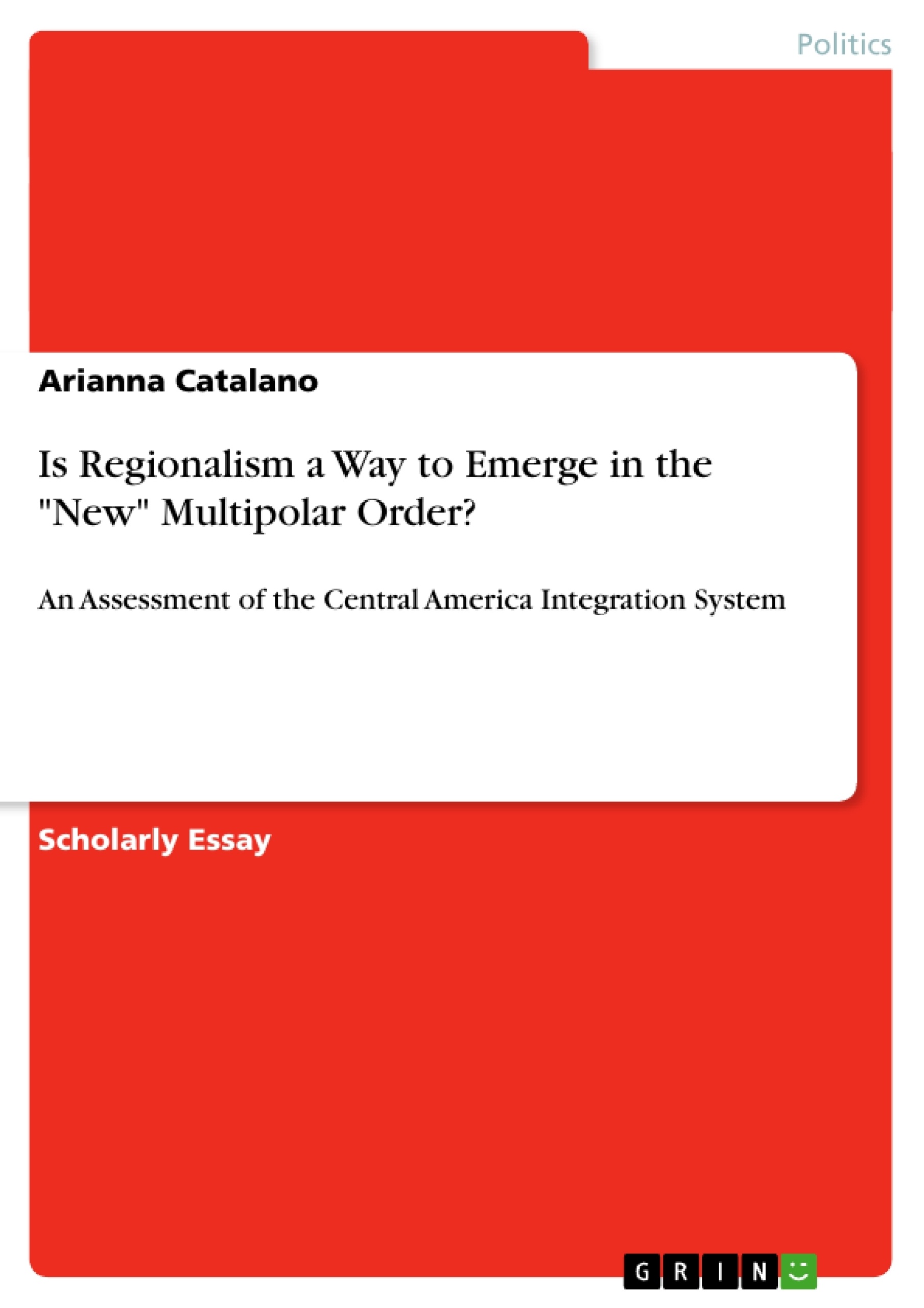The ongoing political and economic trends influencing the present
international order have led to the raise of new powerful actors which play actively in
the global arena. Next to economic giants such as China, India or Russia, a different
set of players is emerging thanks to the gradual process of regionalization. Regional
blocs mainly based on economic cooperation are reshaping the global fragmentation
of power, affecting in turn the status of their member states in the international order.
In this essay two main aspects are taken into account: the structuring of a “new”
multipolar order and the nature and role of regional blocs as actors operating in it.
Thus a third level of analysis is introduced, consisting of the linkage between the
emergence of regional blocs and the impact they have on the international strength of
their member states. In order to provide a better understanding the author means to
focus on the Central America Integration System (SICA) and evaluate whether or not
it has influenced the current Meso-American countries’ status in the “new” global
system’s structure, carrying out a comparison with the most developed regional bloc,
the European Union (EU).
Inhaltsverzeichnis (Table of Contents)
- HOW TO DEFINE THE NEW WORLD ORDER
- REGIONALIZATION PROCESS: AN INTRODUCTION
- REGIONALIZATION: HOW DOES IT EFFECT THE INTERNATIONAL RELEVANCE OF ITS MEMBER STATES?
- CENTRAL AMERICAN INTEGRATION SYSTEM: A COMPLEX AND FRAGMENTED SCENARIO
- CONCLUSIONS
Zielsetzung und Themenschwerpunkte (Objectives and Key Themes)
This essay aims to analyze the impact of regionalization on the international relevance of its member states within the context of a "new" multipolar world order. It focuses on the Central American Integration System (SICA) and its influence on the current status of Meso-American countries within the global system. The essay compares SICA to the European Union (EU) to evaluate the effectiveness of regional integration systems in enhancing their member states' international standing.
- The emergence of a "new" multipolar world order
- The role of regional blocs in shaping the international order
- The relationship between regionalization and the international relevance of member states
- The Central American Integration System (SICA) as a case study
- Comparison of SICA with the European Union (EU)
Zusammenfassung der Kapitel (Chapter Summaries)
- HOW TO DEFINE THE NEW WORLD ORDER: This chapter examines the shift in the international order from the post-Cold War unipolar world to a "uni-multipolar" structure. It analyzes the emergence of new powerful actors, such as China, India, and Russia, and the growing influence of regional blocs. The chapter explores how the US continues to maintain its leading role while facing challenges to its dominance.
- REGIONALIZATION PROCESS: AN INTRODUCTION: This chapter explores the concept of regionalization and its impact on the international system. It discusses the role of regional blocs as actors in the global arena, highlighting their potential to enhance the power and influence of their member states. The chapter also examines the different levels of integration among regional blocs, with the EU serving as an example of a highly integrated system.
- REGIONALIZATION: HOW DOES IT EFFECT THE INTERNATIONAL RELEVANCE OF ITS MEMBER STATES?: This chapter delves into the impact of regionalization on the international relevance of member states. It explores how regional blocs can contribute to strengthening the collective power of their members, leading to increased influence and a more prominent role in global affairs.
- CENTRAL AMERICAN INTEGRATION SYSTEM: A COMPLEX AND FRAGMENTED SCENARIO: This chapter focuses on the Central American Integration System (SICA) as a case study. It examines the level of integration within SICA, the challenges it faces, and its impact on the international standing of Meso-American countries. The chapter compares SICA to the EU to assess its effectiveness in promoting regional integration and enhancing the international relevance of its members.
Schlüsselwörter (Keywords)
The main keywords and focus topics of this essay include: international order, multipolarity, regionalization, regional blocs, Central American Integration System (SICA), European Union (EU), international relevance, state power, economic cooperation, and global influence.
Frequently Asked Questions
What is the central focus of this essay on regionalism?
The essay analyzes how regionalization affects the international relevance of member states within a new multipolar world order.
What is the "SICA" mentioned in the text?
SICA stands for the Central American Integration System, which serves as a case study for regional integration among Meso-American countries.
How does the essay define the "New World Order"?
It describes a shift from a post-Cold War unipolar world to a "uni-multipolar" structure with new actors like China, India, and Russia.
Why is SICA compared to the European Union (EU)?
The EU is used as an example of a highly integrated regional system to evaluate the effectiveness of SICA's own integration process.
Does regionalization increase a state's power?
The essay explores how regional blocs can strengthen the collective power and global influence of their individual member states.
- Quote paper
- Arianna Catalano (Author), 2009, Is Regionalism a Way to Emerge in the "New" Multipolar Order?, Munich, GRIN Verlag, https://www.grin.com/document/179860



